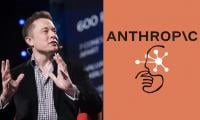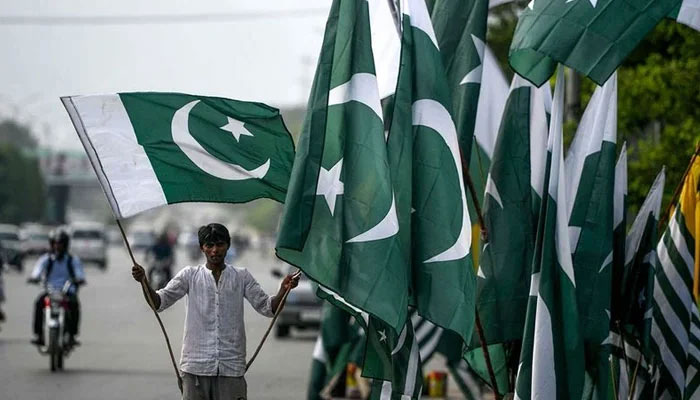The hydra within us
Global powers, while publicly championing stability, privately thrive on nation's precarious balance
Pakistan stands as a monument to Newton's unwritten Fourth Law: A nation in chaos tends to stay in chaos, especially when that chaos benefits many.
Across the merciless chessboard of geopolitics, Pakistan finds itself as both a pawn and a wild card. Global powers, while publicly championing stability, privately thrive on the nation's precarious balance. A weak, economically struggling Pakistan serves their interests, ensuring a degree of subservience and malleability.
Yet, while global actors play their part in this complex narrative, it would be both reductive and misguided to blame Pakistan's woes solely on external influences. The true architects of the nation's perpetual turmoil are found within its borders. Pakistan's predicament is, in large part, a tapestry woven by its own hands, with each thread representing a domestic actor who has mastered the art of profiting from chaos.
In Pakistan, progress and reform face a hydra of vested interests comprising various oligarchies that have built a change-resistant ecosystem. The Hydra of Greek mythology, a creature of many heads, was not merely dangerous for its venomous bite or its fearsome appearance; it was terrifying because of its adaptive resilience. Cut off one head, and two would grow in its place.
In modern Pakistan, this ancient monster finds its spiritual successor in a system where ambition, intrigue and malfeasance regenerate with similar supernatural vigour. This hydra possesses a formidable immune system, fiercely attacking any reform as a foreign body and singularly focused on protecting each oligarch's slice of the dysfunctional pie.
Those dethroned from power cry foul play and wrap themselves in the flag of righteousness, transforming from willing pawns to rebels with a cause in the blink of an eye. Adopting a scorched-earth approach, street protests, inflammatory rhetoric, and tacit support for destabilising elements are their weapons of choice. Any attempt to reform the judiciary is declared an attack on its independence. The fiscal elite prophesise doomsday economic scenarios at the mere whisper of fair taxation, while the untaxed plead that they are practically on the verge of destitution.
Efforts to encourage content moderation or journalistic responsibility are often portrayed as assaults on free speech or oppression of the media. Any endeavour to address extremism and intolerance is painted as an incursion of deeply held beliefs and traditions, conjuring spectres of unforgivable betrayal.
Each attempted reform must navigate this labyrinth of narratives, where every turn reveals another dead end of self-interest. Like a feral guardian of chaos, the hydra with ferocious tenacity resists any authentic change that would extinguish the lucrative fires upon which so many have built their empires.
Yet the hydra's most insidious victory lies not just in thwarting change, but in poisoning the very well of hope from which reform must spring. The dark chapters in our history when initiatives branded as ‘reforms’ were merely Trojan horses or strategic manoeuvres to expand and perpetuate dominion, the bait-and-switch that promised progress but delivered regression have spawned such cynicism and disillusionment that articulating a vision for genuine change has become nearly impossible in this semantic wasteland. The vocabulary of reform has been co-opted and drained of its power to inspire and mobilise.
An apex opportunist, the hydra weaponises the very cynicism it breeds, using public scepticism as yet another weapon in its arsenal to strangle future reforms before they can even take root. The disillusionment it creates serves as both its shield and sword. The hydra within Pakistan operates in a complex web of shifting alliances, effortlessly and shamelessly oscillating between adversary and ally. The oligarchies or ‘hydra heads’ become fierce adversaries when their power or privileges are threatened by fellow oligarchs yet transform into convenient allies when disruption by another suits their interests.
This fluid dynamic unfolded with textbook precision during now-former Chief Justice Qazi Faez Isa's final weeks in office, as segments of the legal fraternity, media, and political forces aligned in an almost synchronised offensive of criticism against him. Without delving into a debate on the merits or demerits of individual judicial legacies, this nevertheless serves as a perfect prelude to understanding Pakistan's broader malaise where principles dance obediently to the tune of interests.
Many of the commentariat who now sanctimoniously dissect CJP Isa’s tenure with surgical precision are the same voices who uncritically lauded former CJs’ constitutional interpretations as judicial masterstrokes or judicial imperialism as patriotic necessity. This pattern of convenient principles and selective outrage is the manifestation of a deep widespread decay and the very lifeforce that sustains the hydra.
Indeed, the graveyard of abandoned principles stretches far and wide beneath the dominion of the hydra, each tombstone marking what was readily sacrificed at the altar of self-interest and expedience. In this twisted ecosystem, principles do not guide but merely serve to justify whatever path we have already chosen to take and whatever serves our immediate interests. This hydra doesn't fight on principles – principles merely serve as the venom in its bite.
Zealous defenders of parliamentary supremacy metamorphose into impassioned advocates of judicial authority; yesterday's voices against institutional overreach craft elaborate justifications for its necessity. Beneficiaries of electoral engineering emerge as fierce critics of the same craft; voices that once decried street politics as democracy's poison now prescribe it as its cure.
Ruthless enforcers of censorship emerge as champions of press freedom when their politics needs a pulpit; defiant critics of backroom politics eagerly prowl and desperately seek admission to those same shadowy corridors; champions of sovereignty and self-proclaimed victims of international interference frantically whisper invitations to foreign powers if it provides a path back to power.
And so, the monster endures, not because it cannot be killed, but because killing it requires something rarer than courage – the willingness to maintain principle precisely when abandoning it would be most profitable. In a system where righteous behaviour is punished and flexibility rewarded, who will bear the cost of conviction? When standing firm means standing alone, who will refuse to bend? Pakistan's hydra isn't sustained by some mythical immortality, but by the self-serving instinct of those who feed it, and it persists because too many have learned to live off the beast they claim to battle.
In Greek mythology, Hercules discovered that the Hydra's regenerative powers could be overcome by cauterizing each severed neck with fire, preventing the sprouting of new heads. One might be tempted to draw a parallel, suggesting that Pakistan's own hydra could be vanquished by the purifying flames of unwavering principles and collective moral courage. Yet while such poetic symmetry appeals to our idealistic sensibilities, reality rarely accommodates such grand gestures.
The task ahead is not to slay the monster in a single heroic or dramatic confrontation, but in the patient, methodical work of dismantling this beast one head at a time and crucially, by reformers who emerge from within each head itself gradually starving the hydra of the boundless ambition that has long been its sustenance.
This, however, necessitates a fundamental recalibration of the national ethos and hinges on an establishment, political or otherwise, that places national interest above personal ascendancy or power; a judiciary that prioritises the law over personal opinion or unchecked authority; a media that values information over sensationalism and objectivity over partisan alliances; and religious leaders who promote both enlightenment and piety.
Only through such resolve and shared purpose can the nation hope to dismantle the self-serving structures of power and build a future of sustained progress and prosperity, where the power elite and common citizen ultimately find their interests aligned. That's the only ‘one page’ Pakistan really needs.
While such transformation may seem like an impossible fantasy, history teaches us that the mightiest hydras have fallen to a few brave souls who dared to light the first torch. All it took were solitary vigils within a nation's institutions that renounced the insatiable pursuit of power in a zero-sum game, viewing it instead as a collective resource that accomplished far more when equitably and sagaciously dispersed. These individual stands of unselfish courage and conviction inevitably converged, shaping societies where power was shared, checked, and diminished in its capacity to corrupt.
But above all else, the chronicles of transformative change through the ages and from nations across the world reveal that the most potent weapon in this Herculean endeavour to vanquish the Hydra lies in the awakening of a civil society that refuses to pardon the unforgivable and forget the unforgettable.
Just as a strong immune system remembers and guards against recurring infections, Pakistan's deliverance from endless chaos demands the cultivation of a public consciousness that sees through the elaborate disguises of reformed democrats, reborn constitutionalists, and repentant patriots who have long profited from the nation's instability. The path to salvation implores building a society that refuses to be perpetually amnesiac – one that has both the wisdom to recognise its tormentors and the courage to ostracize them, regardless of their latest incarnation.
Until then, the nation will remain ensnared in its self-made paradox, a place where instability is the most reliable business model and the inheritance of generations unborn is sacrificed on the shrine of avarice. In this tragic saga, ambitions – individual as well as factional – burn eternal, smouldering as persistent embers, inevitably erupting time and again into an all-consuming inferno that engulfs and overwhelms all else.
The writer is an entrepreneur
living in the United States and the United Kingdom. He can be reached at: sar@aya.yale.edu
-
 King Hospitalized In Spain, Royal Family Confirms
King Hospitalized In Spain, Royal Family Confirms -
 Japan Launches AI Robot Monk To Offer Spiritual Guidance
Japan Launches AI Robot Monk To Offer Spiritual Guidance -
 Japan Plans Missile Deployment Near Taiwan By 2031 Amid Growing Regional Tensions
Japan Plans Missile Deployment Near Taiwan By 2031 Amid Growing Regional Tensions -
 Meghan Markle, Prince Harry Spark Reactions With Latest Announcement
Meghan Markle, Prince Harry Spark Reactions With Latest Announcement -
 Kate Hudson Reflects On Handling Award Season With No Expectations
Kate Hudson Reflects On Handling Award Season With No Expectations -
 6 Celebrities Who Have Been Vocal About Anxiety And 'panic Attacks'
6 Celebrities Who Have Been Vocal About Anxiety And 'panic Attacks' -
 Is This The Future Of Train Travel? Robot Dogs, Drones Are Redefining Public Transit Safety Through China’s New Metro Station Deployment
Is This The Future Of Train Travel? Robot Dogs, Drones Are Redefining Public Transit Safety Through China’s New Metro Station Deployment -
 Sarah Ferguson Seeks Hollywood Backing As Epstein Files Resurface
Sarah Ferguson Seeks Hollywood Backing As Epstein Files Resurface -
 China’s AI Milestone: ByteDance’s Doubao Chatbot Hits 100M Users During Lunar New Year
China’s AI Milestone: ByteDance’s Doubao Chatbot Hits 100M Users During Lunar New Year -
 Think You Know ChatGPT? Here Are 5 AI Levels You’ve Never Seen
Think You Know ChatGPT? Here Are 5 AI Levels You’ve Never Seen -
 Bitcoin Bounces From $62,000 As On-chain Metrics Signal Prolonged Weakness: Here Is Everything To Know
Bitcoin Bounces From $62,000 As On-chain Metrics Signal Prolonged Weakness: Here Is Everything To Know -
 Elon Musk Teases Official Grok CLI For Developers As AI Rivalry With Anthropic Heats Up
Elon Musk Teases Official Grok CLI For Developers As AI Rivalry With Anthropic Heats Up -
 Jennifer Aniston Ready To Walk Down The Aisle Again?
Jennifer Aniston Ready To Walk Down The Aisle Again? -
 Sarah Ferguson’s Plan Now That Andrew Is Thrown Into The Fire: ‘She’s Not Certain She’ll Come Out The Other Side’
Sarah Ferguson’s Plan Now That Andrew Is Thrown Into The Fire: ‘She’s Not Certain She’ll Come Out The Other Side’ -
 ‘The AI Doc’: What AI Leaders Told Daniel Roher Will Keep You Up At Night
‘The AI Doc’: What AI Leaders Told Daniel Roher Will Keep You Up At Night -
 Sarah Ferguson In Hiding As Arrest Fears Grow After Andrew Was Taken Into Custody
Sarah Ferguson In Hiding As Arrest Fears Grow After Andrew Was Taken Into Custody




